AI Dealership Management System (DMS) 101: Project Example, Development Guide & More
There is no doubt that dealership management software is a necessity for all parties involved in the vehicle repair process: customers (vehicle owners), service providers, and DMS partners. Yet, where to look for the right dealership management system (DMS)? Although the modern business ecosystem offers a wide range of automotive software development providers, only a handful can deliver real value built on hands-on experience, deep industry expertise, and a clear understanding of the automotive repair workflow. So, what side do you choose: vendors that rely on generic promises and low-cost pitches but lack the capability to design solutions for the complexity of modern dealership operations? Or an automotive software development vendor who demonstrates proven expertise, shaped by building an AI-driven DMS solution that already supports more than 25% of the US automotive industry? Today, we will prove that developing a functional dealership management system is more than just creating a booking widget or digital calendar. It is all about building a comprehensive digital backbone of automotive service centers. From definition to execution, we will guide you through every stage of the DMS journey, proving that when handled by a professional partner like devabit, building a dealership management system can deliver meaningful transformation not only for your organization but for the automotive industry as a whole. Fasten your seatbelts and get ready for the mind-blowing journey into the world of the automotive dealership management system. Ready, set... Let's go!
To sum up, here are several interesting topics we will discuss today:
- What is DMS? Often referred to as an automotive CRM, a dealership management system (DMS) is an integrated software platform that helps automotive organizations manage their operations, including sales, inventory, finance, repair services, etc.
- In short, a dealership management system is aimed at digitizing the dealership workflow and auto repair lifecycle.
- A standard dealership management system offers a broad scope of capabilities, including inventory & parts control, ERP synchronization, and compliance enforcement, to name a few.
- Dealership management system development costs vary from $50,000 to over $250,000, depending on the project scope and features.
- Among the top dealership management software companies with which our solution is integrated are industry leaders such as CDK Global, Tekion, Fortellis, Dealertrack, and others.
- The devabit team developed a dynamic pricing & capacity management platform that goes far beyond the standard means of DMS, offering a unique time-slot booking system for vehicle owners.
- Our AI DMS solution resulted in:
- 16-24% increase in service gross profit.
- Up to $240,000 extra money revenue for dealerships.
- 10-25% increase in service revenue.
- $1.5 million in seed funding.
- How to develop a dealership management system (DMS)? Here is how we did it:
- Phase 1: Discovery.
- Phase 2: Prototyping.
- Phase 3: MVP development.
- Phase 4: Go-live + feature gap fill
- Ongoing maintenance & support.

- FAQs about Dealership Management Software (DMS)
- What is a dealership management system (DMS)?
- What does DMS software do for car dealerships?
- How much does a DMS cost?
- What is the difference between DMS and CRM?
- Is there a cloud-based DMS/AI-based DMS?
- Can a DMS integrate with my existing tools (ERP, accounting, OEM systems)?
- How does a DMS help increase sales and efficiency?
- What are the top dealership management software companies?
- Does a DMS help with compliance (GDPR, FTC, automotive regulations)?
- Dynamic Pricing & Capacity Management Solution for the Automotive Industry
- What is the system all about?
- How about smart identification & data prefill?
- How does this solution benefit customers?
- How does this solution benefit businesses?
- How about admin & pricing?
- What is the current state of the solution (scaling, optimizations, new integrations)?
- Can you summarize the business value of this solution?
- After All, How to Develop a Dealership Management System (DMS)?
- Do You Need an AI-Powered Dealership Management System (DMS)? Here's Why You Might
- Discover Our Automotive Software Development Services
- Wrapping Up: How to Develop a Dealership Management System?
FAQs about Dealership Management Software (DMS)
Before jumping right to the step-by-step guide on how our team developed an AI-powered auto dealeship management system, let's set up a quick Q&A session with our experts to ensure we are on the same page.
What is a dealership management system (DMS)?
Let's get back to the basics: what is DMS? A dealership management system/software, which stands for DMS, is an all-in-one system aimed at managing all daily operations and activities of dealerships.
Typically, DMS covers all aspects of the automotive organization, including:
- vehicle inventory;
- sales;
- finance and insurance (F&I);
- service scheduling;
- repair orders;
- parts management;
- customer relationship management (CRM);
- compliance.
What does dealership management software (DMS) do for car dealerships?
A dealership management system (DMS) provides a centralized digital infrastructure that connects dealerships and service centers in a functional and convenient digital environment. As we have already sorted out, a standard DMS covers multiple aspects of dealerships (e.g., sales, finance, etc.) that typically require a lot of time and effort when handled separately.
By digitizing the whole dealership workflow and auto repair lifecycle, DMS solutions not only eliminate inefficiencies and enhance profitability but also provide a whole new experience of dealership management where you can extract data from connected databases in minutes, turning them into valuable business insights and growth opportunities.
Summing up, DMS can significantly boost the performance of car dealerships by offering the following capabilities:
- Centralized repair order (RO) management.
- Workshop capacity & technician allocation.
- Inventory & parts control.
- Service scheduling & time-slot optimization.
- F&I (finance & insurance) integration.
- Accounting & ERP synchronization.
- Data security & compliance enforcement.
- Business intelligence & KPI dashboards.
- AI-powered predictive maintenance & scheduling.
- Scalability across locations.

How much does a dealership management system (DMS) cost?
Let's be honest: it is nearly impossible to answer this question directly. In general, the cost of a dealership management system (DMS) depends on numerous factors, including vendor licensing models, scope of integration, customization, and support agreements, to name a few. For instance, dealerships must also consider implementation services, employee training, SLA obligations, and long-term scalability expenses. Subsequently, a comprehensive total cost of ownership (TCO) analysis is paramount to evaluate the actual financial impact and return on investment (ROI).
Speaking of DMS development costs, the prices across the industry could range from $50,000 to over $250,000, depending on multiple factors like project scope, feature complexity, terms of development, and so on.
Pro tip: devabit recommends partnering with automotive software development vendors that provide several cooperation models, so you can choose the suitable option to avoid unexpected costs. By way of illustration, our team offers three cooperation models with various pricing strategies:
- Time & Material: the team workload is adjusted to current project requirements; the client gets billed only for the actual amount of work done. This model is suitable for startups and medium to large-scale projects that require long-term cooperation and are associated with constantly changing/evolving requirements.
- Dedicated Team: long-term cooperation with our agile engineering teams that perfectly fits medium to large-scale projects with vague and changeable requirements.
- Fixed Cost: the project scope, requirements, and costs are defined at the onset of the development process. Perfect fit for low to medium complexity, small projects, and MVPs with strict budget and project requirements.
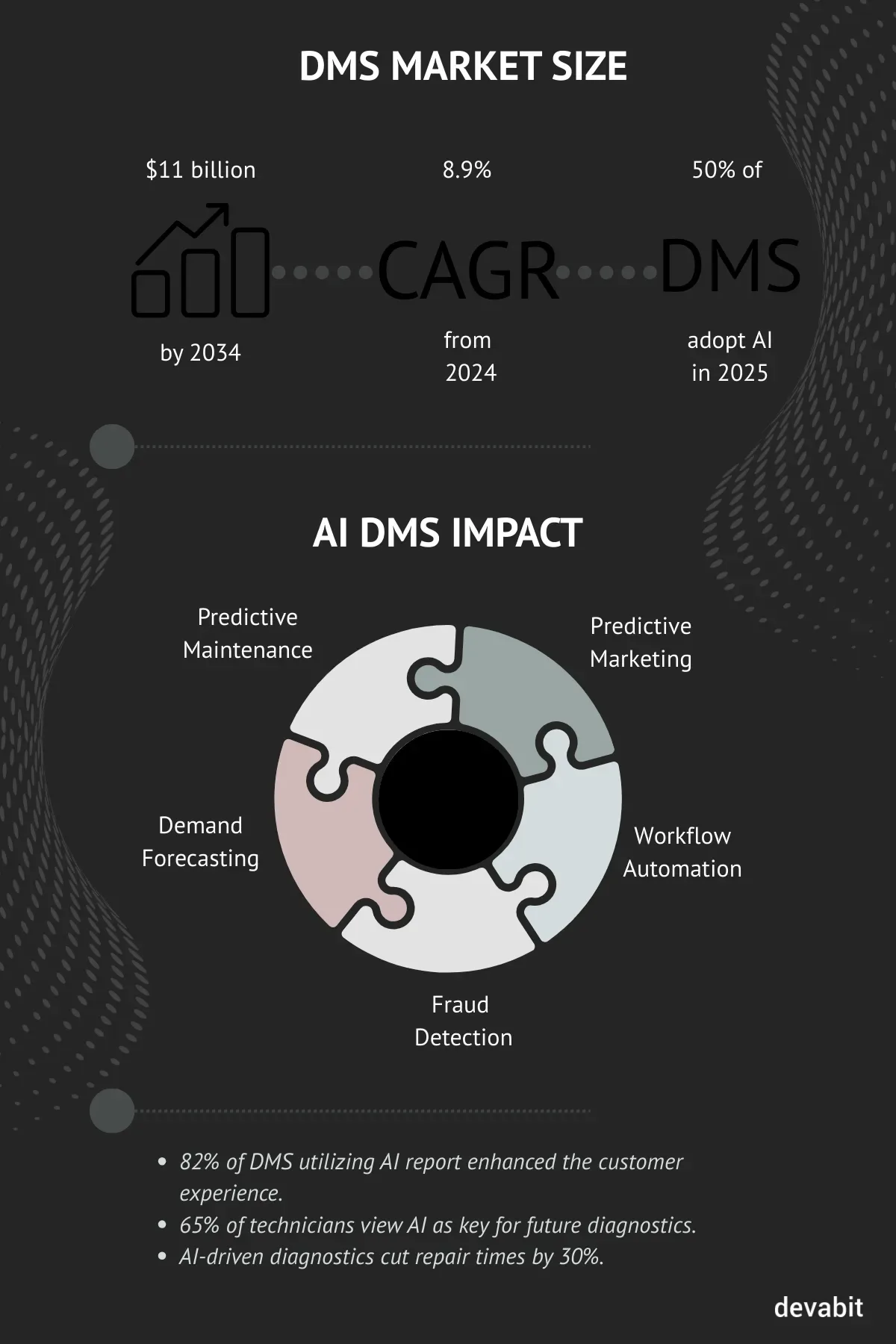
What is the difference between DMS and CRM?
Both intended to manage data and operations, dealership management systems (DMS) and customer management systems (CRM) manage different sorts of information.
A CRM system helps to handle and organize customer interactions, lead pipelines, and marketing activities. A DMS solution, in turn, goes far beyond simple customer engagement. Thus, a dealership management system helps to manage dealership operations (vehicle history management, compliance monitoring, warranty tracking, parts inventory, and workshop capacity planning).
Summing up, CRM refers to a customer strategy, whereas a dealership management system encompasses a broader ecosystem that not only stores customer-related data but also handles operational activities.
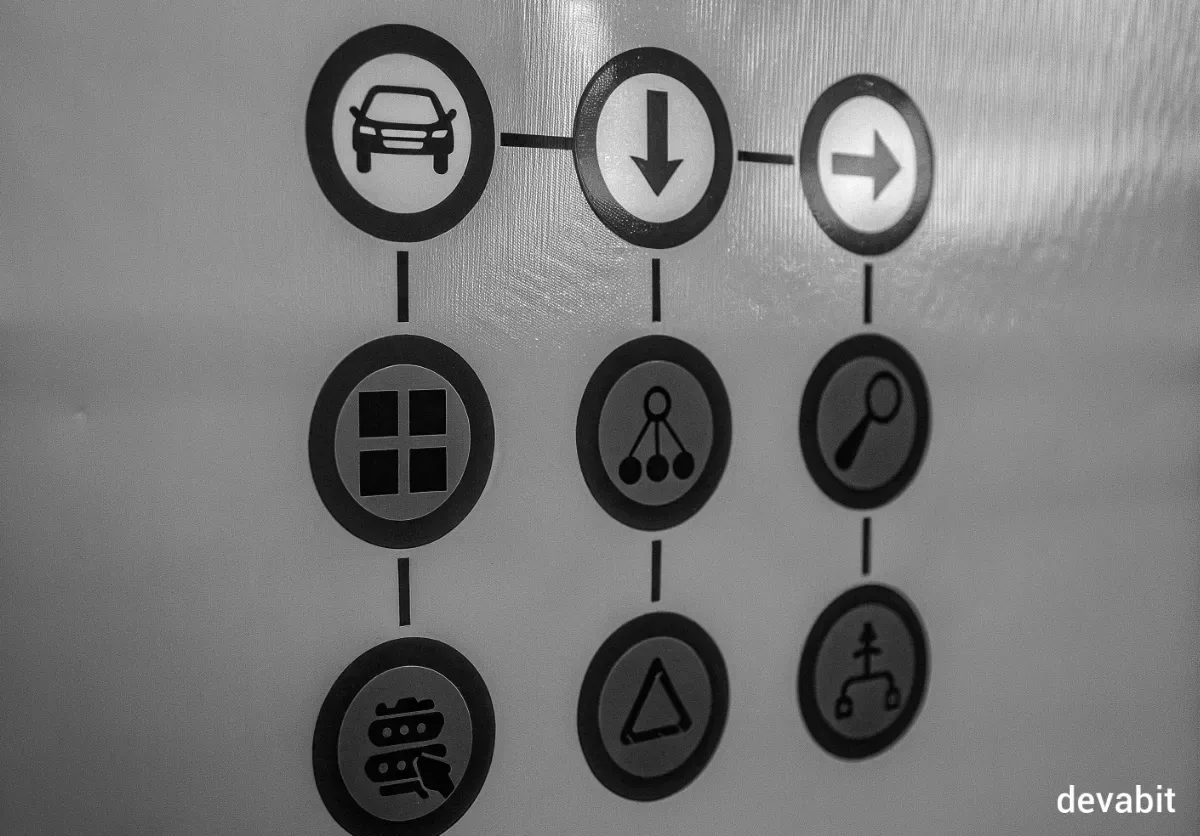
Is there a cloud-based DMS/AI-based DMS?
Yes, our team can develop both a cloud-based DMS and an AI-based DMS. Still, what are the specific benefits associated with these types of dealership management systems? Let's sort things out. A cloud-native dealership management system offers multiple advantages:
- on-demand scalability;
- reduced infrastructure overhead;
- remote accessibility;
- enhanced disaster recovery capabilities;
- faster integration with third-party applications and OEM systems;
- well-suited to dynamic and multi-location dealership networks.
An AI-powered auto dealership management system not only helps companies stay ahead of the curve due to innovative technology but also brings the following advancements to the table:
- predictive maintenance;
- intelligent scheduling;
- virtual assistants;
- fast anomaly detection;
- continuous growth.
Want to hear how devabit developed an AI-powered predictive maintenance solution? Click here to jump in.
Can a dealership management system (DMS) integrate with my existing tools (ERP, accounting, OEM systems)?
At devabit, we design DMS solutions with API-first architectures that provide seamless interoperability with ERP systems, accounting platforms, and OEM service databases. In this way, we not only prioritize seamless integration but also eliminate data silos, enabling a single source of truth across dealership operations.
How does a dealership management system (DMS) help increase sales and efficiency?
Let's share a brief story about a vehicle maintenance challenge we recently solved with our solution to address this question. It is essential to note that our solution goes far beyond the standard means of a dealership management system, integrating DMS with service providers to ensure a seamless car repair process.
When it comes to vehicle service centers, seasonal peaks can be a severe challenge. For example, the rush tire replacement previously led to queues, overworked technicians, and unpredictable daily capacity. Our solution (integrated with top DMS partners and services centers), featuring intelligent scheduling, distributes workloads evenly across technicians, prevents bottlenecks during peak demand, and guarantees service centers function at maximum efficiency.

What are the top dealership management software companies?
Our dynamic pricing and capacity management platform is integrated with top dealership management software companies:
- CDK Global
- Tekion
- Dealertrack
- Clover Connect
- Fortellis
- Indesign Data
- DealerBuilt
- Dominion
- Fiserv
- RM
- Auto/Mate.
Does a dealership management system (DMS) help with compliance (GDPR, FTC, automotive regulations)?
Sure, compliance is an inseparable element of advanced DMS platforms. In a nutshell, DMS compliance contributes to the following factors:
- secure storage of customer data;
- GDPR-compliant data handling;
- digital contracting and eSignatures;
- comprehensive audit trails of vehicle and service records.

Dynamic Pricing & Capacity Management Solution for the Automotive Industry
Now it is time to introduce our unique solution that enables users to schedule a car service in the blink of an eye. Below, we have gathered several questions answered by Olha, our top-tier PM involved in the project.
What Is the System All About?
We are building a time-slot booking system for vehicle owners. The goal is to enable customers to schedule planned maintenance or unplanned repairs at a specific service-center location through a web widget embedded on that location's website (typically on a "Schedule Appointment" page).
- The widget's UI is unified across all service centers.
- Which options appear depends on per-location admin settings (features can be enabled/disabled based on the services that location provides).
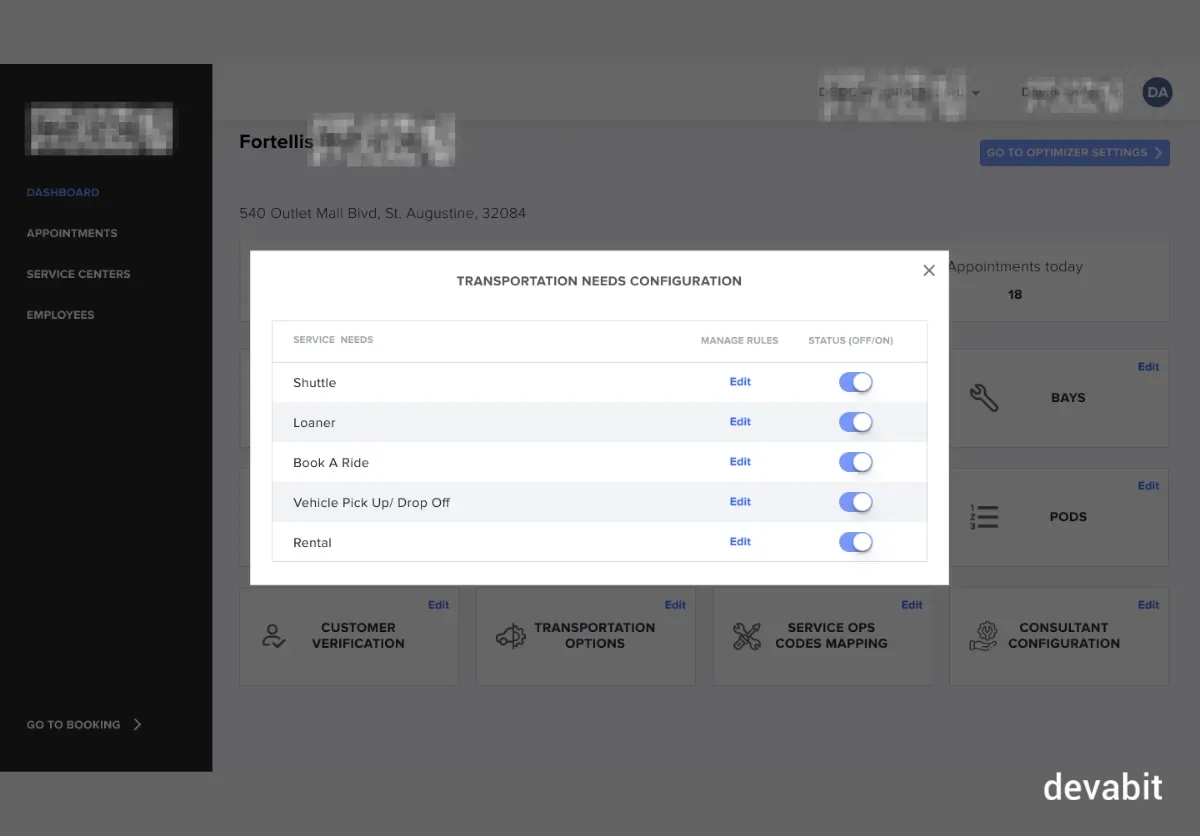
How About Smart Identification & Data Prefill?
When a customer enters either personal details or vehicle details, the system auto-pulls and cross-fills the corresponding data (customer ↔ vehicle). Key identifiers include:
- VIN (unique vehicle identifier).
- Mileage.
- Service history (what work was done, last visit date, etc.).
This historical data is retrieved from multiple DMS integrations (because no single DMS covers all brands). The system chooses the right DMS based on the brands serviced by each service center.
Dealer / service-center model:
- There are dealerships that have multiple service centers.
- Each service center is authorized for specific brands (e.g., BMW, Honda, Ford).
- A location may cover multiple brands depending on its profile.
- We integrate with the corresponding DMS per brand. For example, we recently added an integration that covers a large portion of the US market (25%) to enrich historical data.
The client tells us which DMS to connect for a given center (they have the contracts). In production, when we create a new service center, we attach the appropriate DMS integration so that the center's widget/API calls fetch the right data.
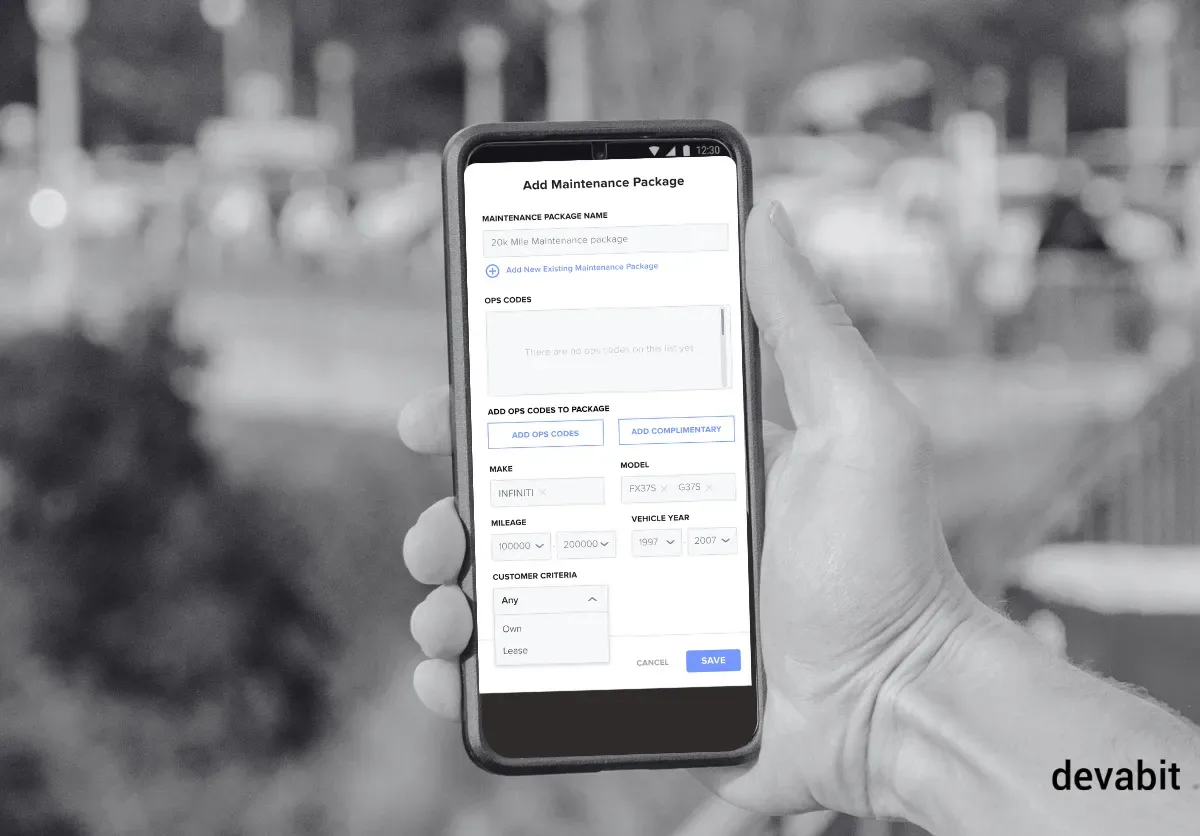
How Does This Solution Benefit Customers?
In the US, many spots historically handled service by walk-ins or phone signups, producing queues (e.g., seasonal tire changes). Our booking flow solves the inconvenience:
- Owners can self-schedule online for a preferred date/time.
- Some centers offer mobile services (technicians come to the customer's home) or pickup/return services if the car breaks down — these are exposed as optional features via admin settings.
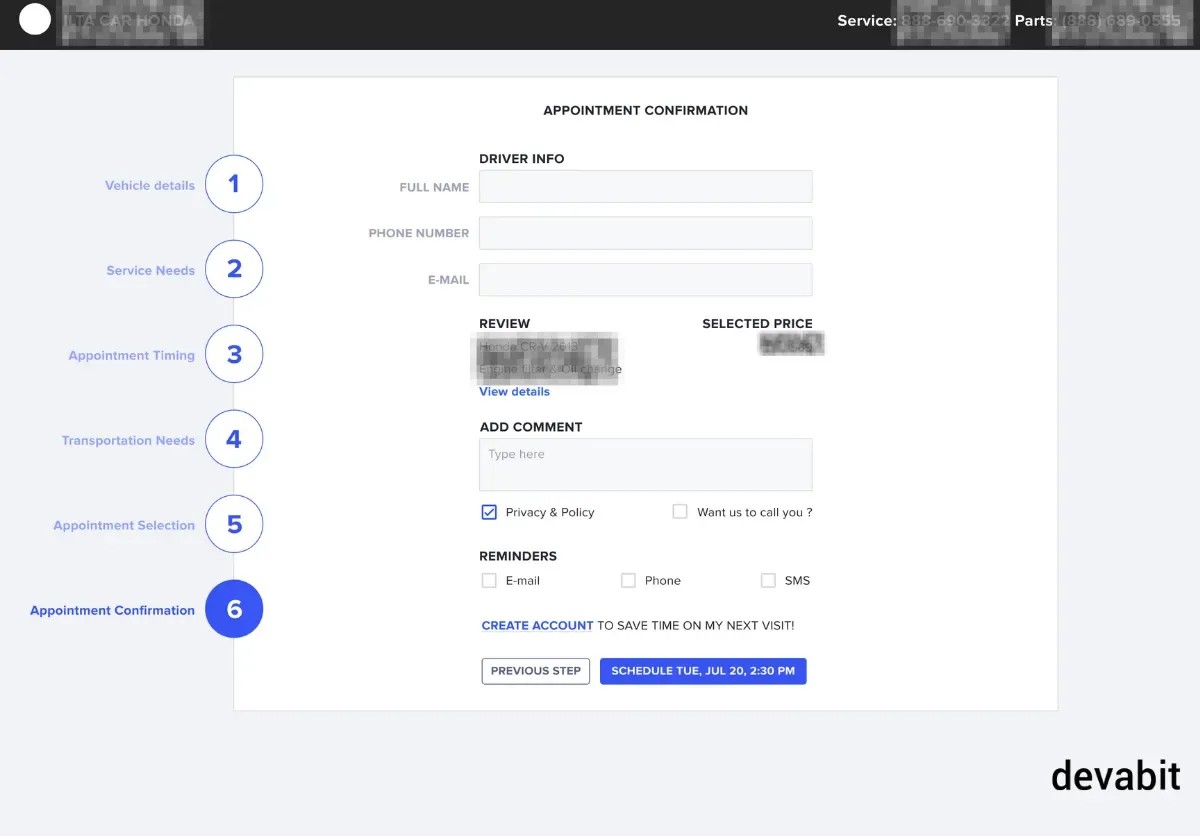
How Does This Solution Benefit Businesses?
The system helps level staff workload:
- Each technician has capacity rules (e.g., tire change takes ~1h15m; a tech can do ~5/day).
- The scheduler will not overbook beyond the set capacity; overflow is routed to other technicians.
- If a day is under-utilized, managers can apply discounts to specific time slots to spur demand. Customers then see discounted slots for same-day or targeted hours.
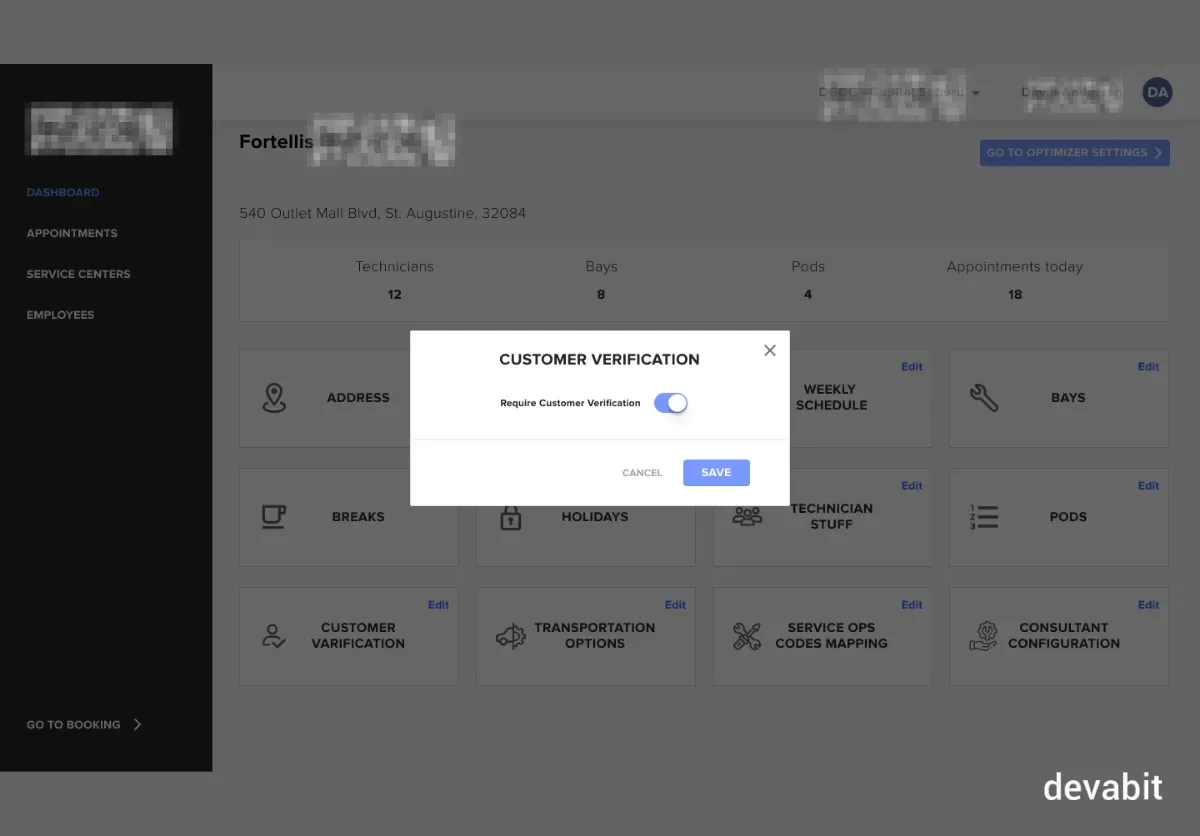
How About Admin & Pricing?
The admin app lets service-center managers:
- Configure teams and skills (which techs can perform which job types).
- Manage service catalogs and pricing.
- Prices can:
- Flow from the DMS, if the DMS already sets them; or
- Be overridden/defined in admin (the admin value becomes the final customer price).
- Apply discounts and rules (dynamic logic formulas) that influence the final booking price.
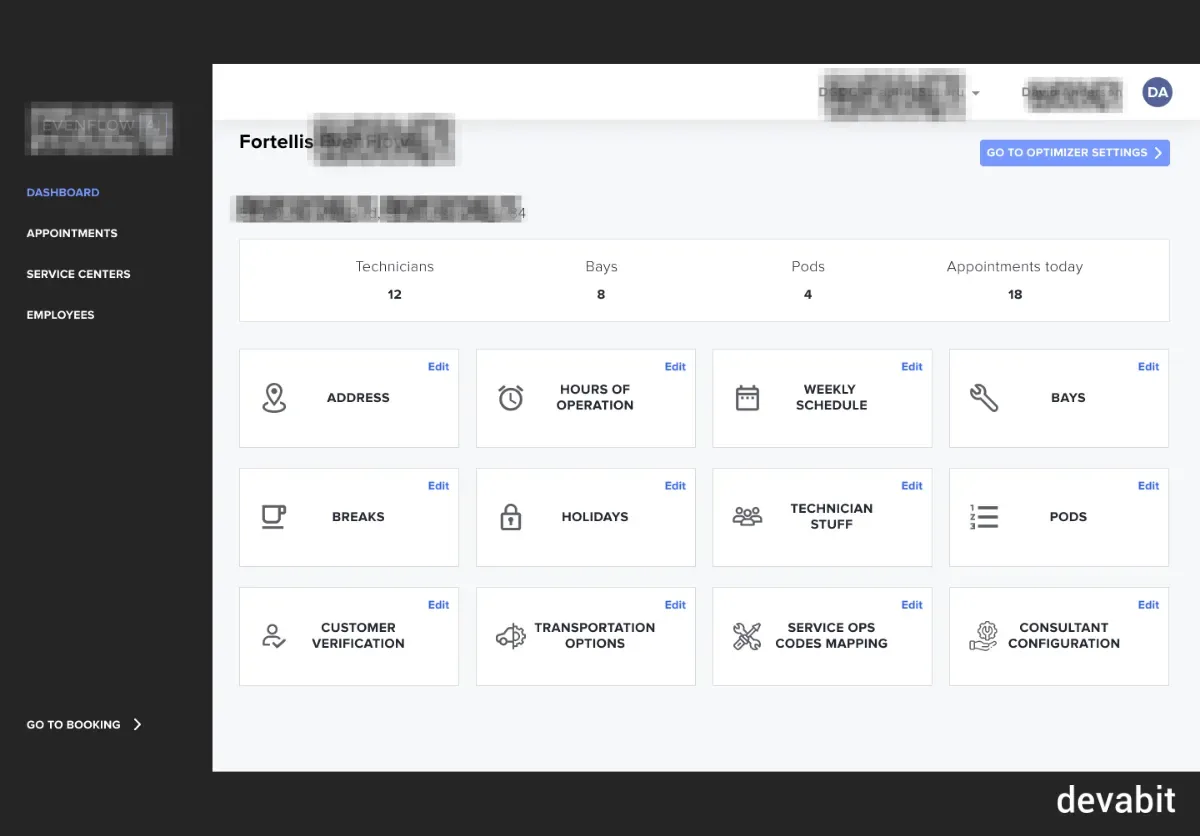
What Is the Current State of the Solution (Scaling, Optimizations, New Integrations)?
- We continue to add features required for onboarding new centers.
- We are doing performance and scalability work (higher DB and API loads as centers scale; some centers create up to 100 appointments/day).
- We add new DMS integrations as needed and handle deprecations (e.g., a legacy DMS is shutting down its old API; we’re migrating centers to the vendor’s newer, faster API).
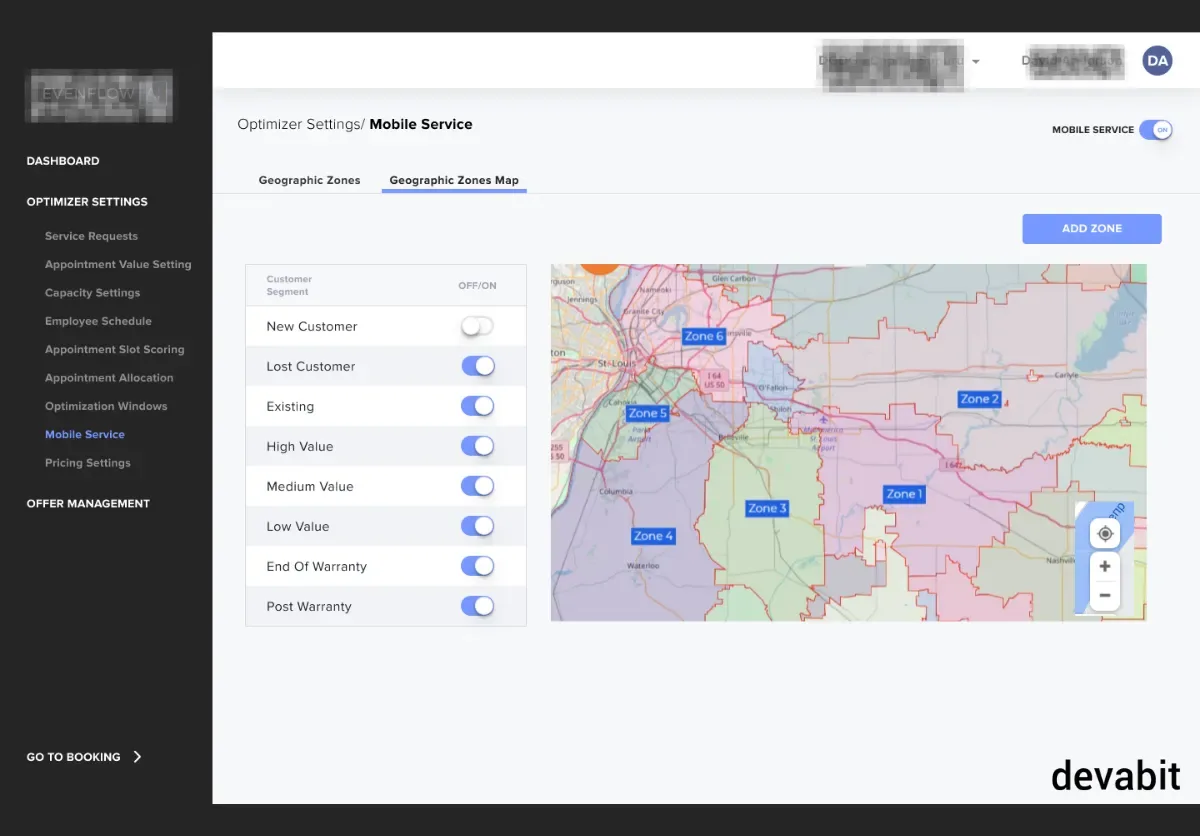
Can You Summarize the Business Value of This Solution?
A DMS-integrated booking platform that:
- Gives customers a fast, self-serve way to schedule service (with optional mobile/pickup services).
- Gives service centers capacity-aware scheduling, dynamic pricing/discounts, rich admin controls, and historical data via per-brand DMS integrations.
- Fills in less popular appointment slots by providing incentives and discounts.
- Manages all your service locations from one centralized place.
- Utilizes smart reporting and analytics to enhance pricing margins and schedule regular check-ins with customers, enabling you to offer all available services efficiently.
- Is built to scale, continuously extended by new features and integrations, and ready for API changes in the DMS ecosystem.
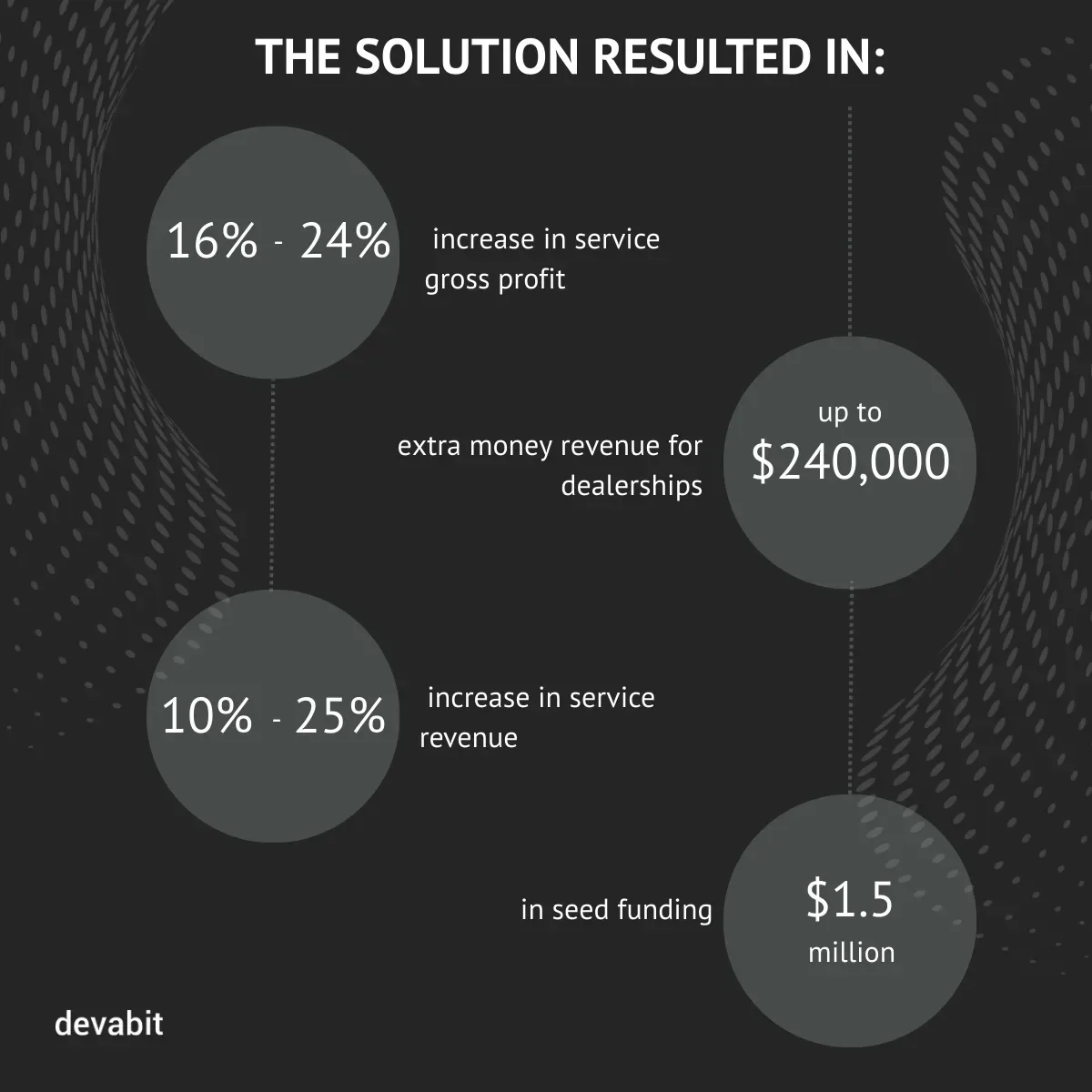
After All, How to Develop a Dealership Management System (DMS)?
As we have already sorted out, our solution is something more than a simple dealership management system (DMS). Applying airline industry revenue management techniques, we managed to build an all-in-one platform that not only takes the best from an integrated DMS that can completely replace internal CMS solutions. Here is a brief summary of our development journey:
- Phase 1: Discovery. The client came with an AI-driven vision; we clarified the scope and feasibility.
- Phase 2: Prototyping. We built clickable wireframes to validate the MVP flow, then finalized the UI design. The client tested the concept with prospects, gathered feedback, and we refined the prototype.
- Phase 3: MVP development (1 year).
- Phase 4: Go-live + feature gap fill (2 additional months) to reach market viability.
- Early adopters started with just the embedded booking widget; as value became clear, they also adopted the admin and gradually migrated away from prior CRMs.
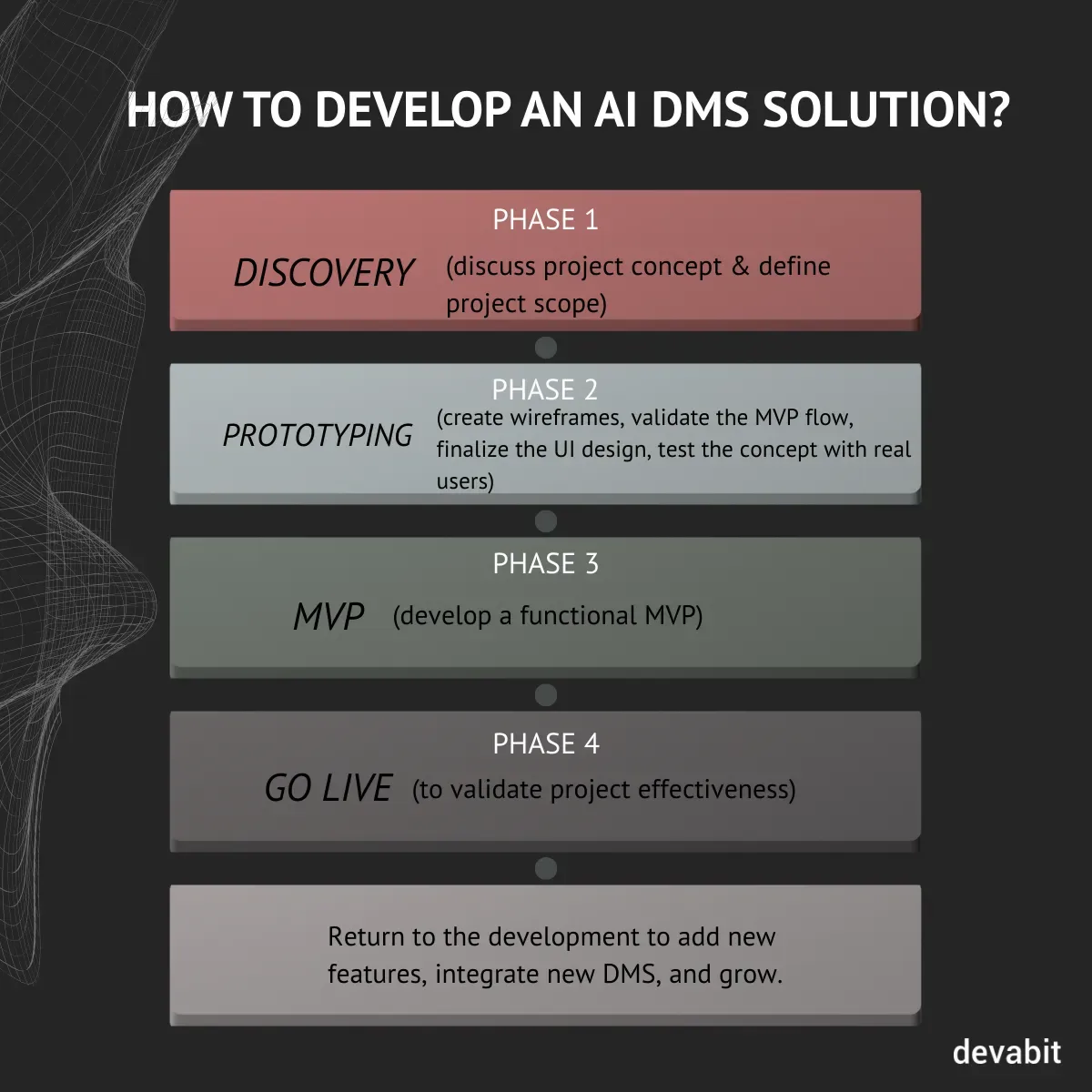
Do You Need an AI-Powered Dealership Management System (DMS)? Here's Why You Might
We do not simply craft standard dealership management systems with limited functionality. We design comprehensive solutions that cover the majority of the US automotive market and set new industry standards.
01 / We started with an idea. Now this idea is a US leader in dynamic pricing and capacity management.
Sometimes, all it takes is a good project concept and a skilled team to turn this idea into a working product that shapes the industry. Luckily, you are at the right place at the right time. Working with multiple companies in the automotive domain, we know this industry inside and out. And we know how to make your solution work for you, and not vice versa. From industry regulations to unique workflows that benefit all parties involved in the vehicle maintenance process, we ensure that even the smallest aspects are polished to perfection. That is just how we work, always.

02 / We do not just talk. Each word is supported with hands-on experience.
You have probably seen those websites promising the moon for $5. Catchy slogans, generic sales pitches, and little to no real expertise. "But we can do it for you." Honestly, that is not us. We do not believe in shortcuts (and we would not recommend them to you either). At devabit, we are all about crafting solutions that truly work in real life. We do not sell magical success recipes. We talk to real people, take real concepts, and apply our deep technical knowledge and experience to turn these project concepts into functional solutions that solve real problems. That is how straightforward yet efficient this is. No magic, just pure dedication that leads to real results.

03 / We have done it multiple times, so we 100% know how to do it for you (fast, reliable, and at a reasonable price).
Buy nice or buy twice. This old proverb perfectly resonates with the modern business ecosystem. While some companies consider outsourcing to India or the Philippines in the rush for cheap solutions and short development terms, the quality of such solutions leaves much to be desired. As a result, companies overpay for costly improvements, constantly delaying the release. And this, unfortunately, can be a deadly strategy for startups with a limited budget. Meanwhile, we offer reasonable prices for high-quality results that bring maximum value in the long run. With several cooperation strategies, our clients get transparent pricing options that perfectly fit their requirements.
Emerging AI Trends to Blow Your Mind
AI DMS are impressive, for sure. But the impact of AI in the automotive sector spans far beyond DMS solutions. Here are several AI automotive trends examples that will wrap your head around:
- Edge AI-first vehicles. Located directly on the vehicle's sensors, edge AI modules enable ultra-fast ADAS, automated lane changes, and safer decision-making in milliseconds.
- Generative AI in the cockpit. From voice-first manuals to intelligent in-car assistants, generative AI offers incredible opportunities for bringing driving experience to an entirely new level.
- Explainable AI assistance. Why is this route the best? Is the sound from the engine normal, or does your car require an immediate checkup? Explainable AI assistants help drivers get real-time answers on the go.
Do you find AI innovations fascinating? Hurry up and be the first to explore the emerging AI trends across various industries:

Discover Our Automotive Software Development Services
From strategic consulting to scalable cloud platforms and advanced engineering, we provide full-cycle automotive software development designed to transform mobility and strengthen industry performance.
- Connected Vehicle Technology
- Automotive Cloud Solutions
- AI, Machine Learning & Computer Vision
- Enterprise Mobility Solutions

Wrapping Up: How to Develop a Dealership Management System?
Here comes another question: Do you really want to develop a standard DMS? Spoiler: Sure, we can easily handle it. However, if our development journey inspired you to consider an AI-powered auto dealership management system that goes far beyond the standard means of DMS, we are here to help. We are proud to stand behind such a powerful and dynamic pricing and capacity management solution, and we would be extremely proud to develop something significant for your team as well.

Ready to catch the wave of innovation? You do not have to footslog through this complicated route on your own. We have done it multiple times and know the best path. Let us guide you and enjoy the ride. Talk to our experts to start your journey right now.
Recent Publications
Don't miss out! Click here to stay in touch.
Discover More

Relevant Articles View all categories
View all categories CONNECT WITH US WE’RE READY
TO TALK OPPORTUNITIES
THANK YOU! WE RECEIVED YOUR MESSAGE.
Sorry
something went wrong



